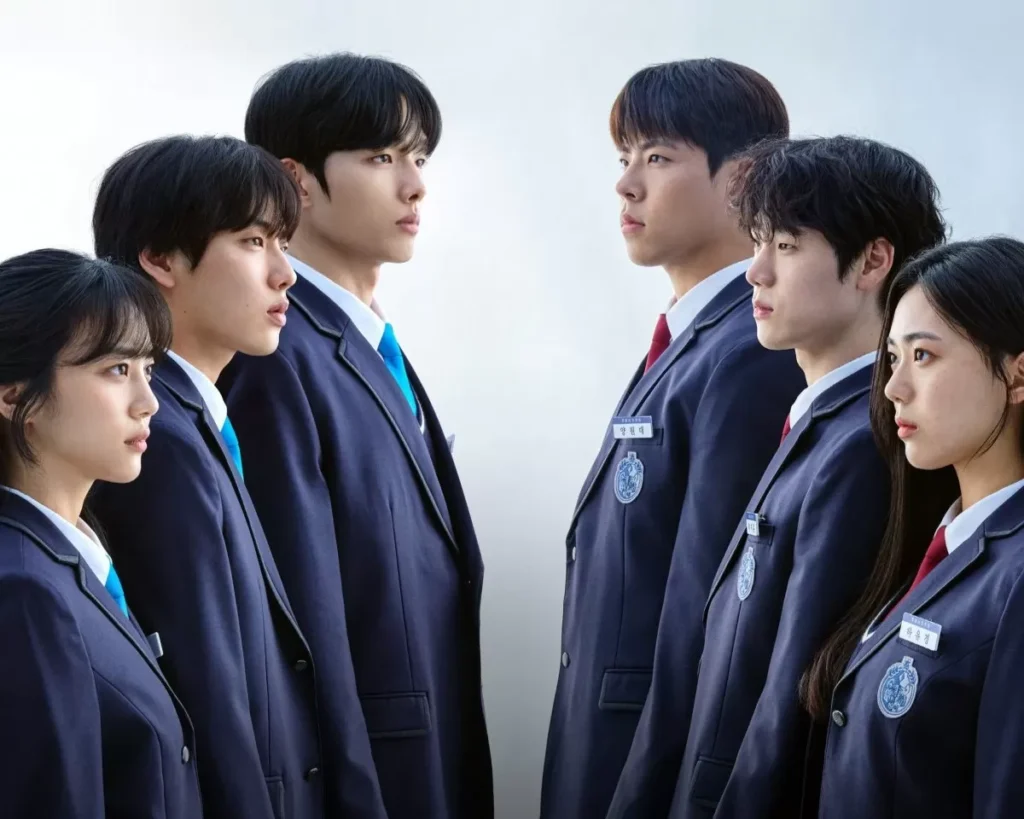A politically charged K-drama that brilliantly reimagines youth elections as reflections of adult corruption and ambition.
📝 Overview
Title: I Am a Running Mate (러닝메이트)
Episodes: 8
Genre: Political satire, youth drama, coming-of-age
Directed by: Han Jin-won (Oscar-winning co-writer of Parasite)
Streaming on: Netflix
Main Cast:
Yoon Hyun-soo as Noh Se-hoon
Lee Jung-sic, Choi Woo-sung, Hong Hwa-yeon, Lee Bong-joon
🔍 Introduction
“I Am a Running Mate” is not just a high-school drama—it’s a sharply written, politically soaked microcosm of real-world governance, competition, and ideology. It dares to place a teenage student council election under the same critical lens reserved for national politics, echoing the social commentary style of Parasite and the moral stakes of Sky Castle or Class of Lies.
Through this lens, director Han Jin-won examines themes of identity, ambition, morality, manipulation, and peer pressure, showing how quickly youthful idealism can be corrupted.
🧠 The Premise: Satire Meets Coming-of-Age
At its core, the story revolves around Noh Se-hoon, a bright and idealistic student who is caught in a viral incident that severely damages his image. In a bid to reclaim his credibility and self-worth, he unexpectedly finds himself entering the school’s vice-presidential race. But the student council election is not a simple popularity contest—it’s a ruthless power struggle orchestrated by cunning allies, opportunists, and ideologues.
Much like real-world elections, it involves:
Media manipulation
Ideological warfare
Image crafting
Strategic alliances
Betrayals
The drama cleverly uses these tactics to showcase how power distorts principles—even in the seemingly innocent halls of a school.
🧍♂️ Character Study: Noh Se-hoon and the Rival Field
🔹 Noh Se-hoon – The Everyman Idealist
Initially, Se-hoon is portrayed as a model student. But following a public scandal (involving a perceived act of cowardice or selfishness), he becomes ostracized. This humiliation triggers his internal transformation: from someone who simply wanted to “be good” to someone forced to question what “being good” means in a system that rewards deceit and manipulation.
Character Arc:
Episode 1-2: Hesitant and apologetic
Episode 3-5: Learns realpolitik and strategic decision-making
Episode 6-8: Faces moral dissonance and personal reckoning
Se-hoon is not heroic in the traditional sense. His ambiguity and struggle to maintain his values in an increasingly toxic environment make him deeply human and relatable.
🔹 Lee Bong-joon – The Populist
He uses charm and relatability to amass popularity. Bong-joon’s character reflects populist leaders who claim to speak for the masses while masking ulterior motives.
🔹 Yang Won-dae – The Technocrat
A policy nerd obsessed with rules and structure. Won-dae presents an alternative vision—one based on logic, stats, and transparency—but lacks the emotional intelligence to truly connect.
🔹 Yoon Jung-hee – The Strategist
Perhaps the most Machiavellian figure in the race, Jung-hee is ambitious, pragmatic, and always five steps ahead. She uses the system’s weaknesses to her advantage—playing everyone against each other.
🔹 Kwak Sang-hyun – The Revolutionary
An outsider who stands on ideology and radical change, Kwak challenges the entire notion of the student government. He’s fiery, magnetic, and dangerous to the establishment.
🗳️ Election as Allegory
The show goes beyond a literal school election to present a layered critique of:
Modern democracy
Media manipulation
Character assassination
Performative activism
Peer pressure and cancel culture
Every decision made during the campaign mimics real-world electoral strategies—managing optics, spreading rumors, flipping narratives. Even the campaign posters are laced with subtle jabs and visual metaphors.
Some moments directly parody Korean political history and scandals, offering a smart meta-commentary on the state of real-life institutions.
🧩 Episode Breakdown & Themes
Episode 1: The Fall
Se-hoon’s reputation collapses after a viral video misrepresents his actions. The school’s reaction mirrors the intensity of public opinion in the digital age.
Theme: Reputation, social punishment
Episode 2: The Rise
Urged by a new friend and motivated by frustration, Se-hoon joins the election, reluctantly.
Theme: Redemption, motivation
Episode 3: Allies & Enemies
Campaign teams form. The show introduces rival ideologies and political personas.
Theme: Power alliances, image crafting
Episode 4: The Debate
Tensions flare during a televised debate that goes off-script.
Theme: Truth vs narrative, performance politics
Episode 5: Dirt and Deals
Dark secrets are used as leverage. Campaigning becomes aggressive.
Theme: Ethics in politics
Episode 6: Collapse
Friendships crack under pressure. Loyalties shift.
Theme: Betrayal, survival
Episode 7: The Vote
Voting day. Twist outcomes.
Theme: Responsibility, consequences
Episode 8: Aftermath
Win or lose, the characters must face their decisions.
Theme: Identity, maturity, the cost of ambition
🎞️ Cinematic Style
Han Jin-won’s direction is visually rich and layered:
Tracking shots during debates enhance the feeling of surveillance and scrutiny.
Color grading shifts subtly to mirror power dynamics—warmer tones for hope, cold hues for despair.
Symbolism is used frequently: locked doors, shattered mirrors, even vote slips as metaphors for moral choice.
🎼 Music & Score
The soundtrack underscores the emotional tension with minimalist piano pieces, brooding synths, and dramatic crescendos. Notable tracks include:
“Vote For You” – a haunting, ironic theme that plays over emotional breakdowns.
“Echoes of the Hallway” – used during moments of quiet reflection and confrontation.
📚 Social Commentary
The brilliance of I Am a Running Mate lies in how it merges youth issues with adult critiques:
Peer dynamics mirror national polarization.
Teen insecurities reflect adult hypocrisies.
False activism mirrors PR politics.
It asks: Are young people inherently better? Or do they simply mimic the broken systems they inherit?
This is where the show earns comparisons to Parasite—not just because of Han Jin-won, but because of how class, optics, and strategy dominate both narratives.
🙌 Performances
Yoon Hyun-soo delivers a nuanced performance, evolving from quiet and tense to conflicted and self-aware. Supporting cast members each embody different archetypes without turning them into clichés—especially Hong Hwa-yeon’s complex turn as Jung-hee.
❗Criticisms
Compressed format: At 8 episodes, some subplots and character motivations feel underdeveloped.
Occasional over-satire: At times, the drama leans too heavily into political allegory, sacrificing emotional payoff.
Pacing dips in episodes 5–6 as setup overwhelms momentum.
🏁 Conclusion
“I Am a Running Mate” is more than just a teen drama—it’s a politically literate, psychologically layered, and emotionally resonant portrayal of how power works and why it corrupts. It’s a bold statement from Han Jin-won, who proves that youthful environments can hold just as much complexity and gravity as any adult world.
Highly recommended for fans of:
Parasite, Sky Castle, The Glory, Class of Lies
Political dramas with social commentary
Coming-of-age tales with moral stakes
Overall Rating: 9/10
Rewatch Value: High
Best Episodes: 3, 4, 7
Most Memorable Quote:
“It’s not about who’s right. It’s about who speaks first.”







